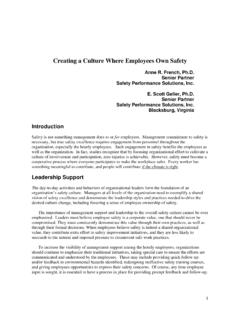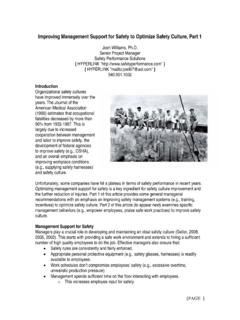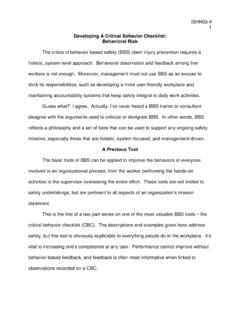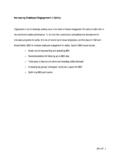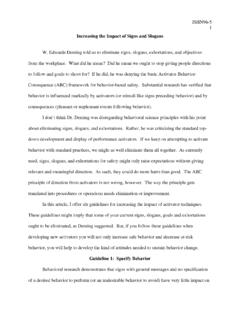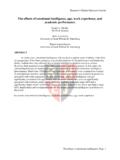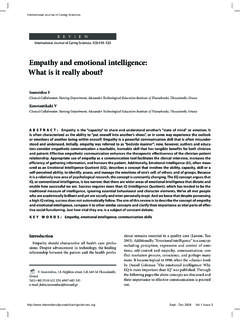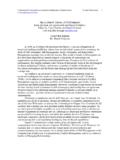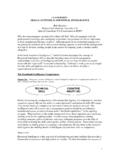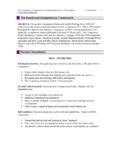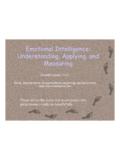Transcription of The Value of Emotional Intelligence - Safety …
1 ISHN 96-10 1 The Value of Emotional Intelligence It happened over 40 years ago, but I remember the incident as if it were yesterday. It was a critical Emotional event in my life, and such events take a permanent seat in long-term memory. The 27 students in my sixth-grade class took an Intelligence test and then we followed the teacher s instructions to grade our own exams. The final number was presumably a measure of our Intelligence , and supposedly indicative of whether we should pursue a college education. The teacher announced that a score of 100 indicated average Intelligence .
2 She said that those of us who didn t score higher than 100 should consider a career path that did not require a college education. My score was exactly 100, and I was devastated. From the time I entered the first grade I had my heart set on becoming a medical doctor like my father, and now my test score said I was not smart enough to even attend college. And when I asked the teacher later she said I should lower my aspirations and consider vocational education. Fortunately I had supportive parents who helped me get over this traumatic event, and insisted that I should follow my dreams.
3 They reassured me that I should not take the results of that test seriously and pointed out my other achievements. After all, I was an A student, and was successful in a variety of other group and individual activities, from sports and Boy Scouts to playing a musical instrument. But, it was not until I studied psychological testing in college that I realized the fallacy of that traumatic testing experience in sixth grade. Obviously, students should not have been allowed to see their test scores, and indeed the self-scoring of aptitude and achievement tests ceased many years ago.
4 My education also informed me about the relative effectiveness, or I should say ineffectiveness, of Intelligence tests to predict success in college and a future career. Most importantly, my later study of research in graduate school revealed another kind of Intelligence which is much more predictive of people s ISHN 96-10 2 ability to follow their dreams. And, the exciting thing about this Intelligence is that it can be learned and developed through education, training, experience and feedback. Daniel Goleman calls this special ability, Emotional Intelligence in his best selling book by the same title (New York, Bantam Books, 1995).
5 Safety professionals need to cultivate this kind of Intelligence in themselves and others. What is Emotional Intelligence ? First, it s important to realize the fallacy of IQ (for Intelligence quotient) as a key determinant of success in life. When I was an adolescent in the 1950 s, a person s IQ or mental capacity was considered a key determining factor of success in school and in a later career. It was believed you had to have a high IQ in order to be a successful engineer, doctor, lawyer, or university professor.
6 And, it was commonly believed in those days that paper and pencil tests were available to obtain a fair and accurate measure of a person s Intelligence . For example, your score on the SAT (for Scholastic Aptitude Test) was presumed to measure your capacity to handle college-level course work. Today, it is generally believed that intellectual capacity (or IQ) is much more complex and difficult to measure, and the numbers obtained from Intelligence tests (including the SAT) are not very effective at predicting success in college or in a professional career.
7 Not too long ago the A in SAT was referred to as Achievement rather than Aptitude to reflect a measure of one s level of knowledge from personal learning experiences rather than an inborn intellectual capacity. Today, the Educational Testing Service (creators of the SAT) use Assessment as the A-word, presumably to reflect a middle ground between aptitude (innate ability) and achievement (acquired knowledge). The important point for our discussion is that ISHN 96-10 3 the SAT (whatever the A word) is often a terrible predictor of success (or failure) in college, and this is largely because of Emotional Intelligence .
8 From his comprehensive review of the research, Daniel Goleman concludes that At best, IQ contributes about 20 percent to factors that determine life success, which leaves 80 percent to other factors ( ). He then goes on to show convincing evidence that a majority of the other factors can be associated with Emotional Intelligence or one s ability to: a) remain in control and optimistic following personal failure and frustration, and b) to understand and empathize with other people and work with them cooperatively.
9 In his influential book: Multiple Intelligences (New York: Basic Books, 1993), Howard Gardner refers to the first ability as intrapersonal Intelligence and the second as interpersonal Intelligence . We show intrapersonal Intelligence when we keep our negative emotions (including frustration, anger, sadness, fear, disgust, and shame) in check and use our positive emotions or moods (such as joy, passion, love, optimism, and surprise) to motivate constructive action. Much of my motivation to study for exams or prepare for speeches, for example, comes from a strong desire to avoid the negative emotions ( , fear, frustration) associated with being unprepared to handle a stressor.
10 And when such preparation leads to success, the joy of achievement builds self-confidence, personal control, optimism and even self-esteem. Then, these pleasant consequences motivate hard work to achieve them again. We demonstrate interpersonal Intelligence when we correctly recognize the moods, emotions, motives, or feeling states of other people and react appropriately. As I ve discussed in previous ISHN articles, this kind of Emotional Intelligence requires both empathic listening and actively caring feedback (see for example, my ISHN articles last April and July).
